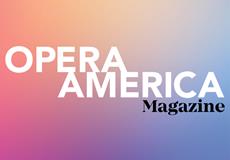A Place of Learning
Increasing equity, diversity and inclusion (EDI) across the field has become a central element of OPERA America's work. At our conferences and forums, we've worked to move the conversation about EDI related topics to the center of each agenda. We've provided support, both financial and informational, to members' efforts aimed at making authentic connections with our audiences and the communities where we live. Still, as Marc A. Scorca, our president and CEO, has repeatedly reminded us, we approach this work not from a place of knowing, but a place of learning.
One way we are learning about these issues is by addressing OPERA America's internal culture. We participated in the Racial Equity in the Arts Innovation Lab, a yearlong program run by the racial justice organization Race Forward that guided 60 New York City arts organizations toward a deeper involvement with racial equity work. Our staff has engaged in facilitated dialogue, exploring systems of oppression that affect our own lives and organizational culture.
In 2018, we created an "equity prime," a reminder to be race explicit within our work and to consider the impact of our decisions on people of color. The equity prime takes the form of a series of questions, geared toward priming the conversation around EDI: Whom are we benefitting? Who is represented in our conversations - and who is left out? These exercises, conducted several times a year at our staff meetings, are not aimed at evaluating our success, but at priming our thinking and creating a trigger around various biases we may implicitly bring to the table.
The effect has been to raise the consciousness of every employee in every department of OPERA America. Our commitment to EDI has affected the language we use in our marketing and our development communications. It has shaped the panels and discussion themes at our forums and at Opera Conference. It has guided the topics in Opera America magazine. Everybody in our organization has made EDI a priority.
By practicing what we preach, we hope not just to enhance our own organizational culture, but to provide an outward-facing model. As we learn to be explicit in confronting centuries old systems of bias in the performing arts, we hope to foster conversations throughout the field about EDI. Who is telling the stories in opera? How can we take a more inclusive approach to casting? How do we create new opportunities for underrepresented groups - particularly people of color and women?
We have constructed a values statement reflecting our vision for a more equitable culture, "OPERA America's Commitment to Equity, Diversity and Inclusivity." The statement addresses various forms of equity: racial, gender, age, economic. OPERA America has already taken great strides to address gender equity in the field through the creation of the Women's Opera Network and the launch of Opera Grants for Female Composers and the Mentorship Program for Female Administrators. As the organization's EDI officer, I have focused much of my recent work on racial justice. This is not a parallel effort, but it supports our ongoing work on gender parity, while acknowledging that intersections of identities may result in multiple barriers to success.
We recognize that it's time for change in our field. It's time to understand opera's history of privilege, and what it means for those who have not shared in that privilege. As we seek to "diversify our audiences," we can't then criticize new audiences for not understanding the art form when they raise issues about racial stereotypes, misogyny and cultural appropriation. We must always listen if we want to effect change. Equity is not easy. It requires ongoing examination of our traditions and biases.
For many, change is scary. It raises fears that may be rooted in a perceived loss of power. OPERA America firmly believes diverse representation among members' boards, staff, artists and audiences involves no sacrifice of opera's core elements; instead, it will result in new thinking, in new stories and in the overall growth of the art form.
It's also just the right thing to do.
OPERA AMERICA'S EDI EFFORTS: A TIMELINE
2014
OPERA America launches Opera Grants for Female Composers, funded by the Virginia B. Toulmin Foundation, to support opera compositions by women.
2015
The Women's Opera Network is formed to foster gender parity in the field.
2016
OA creates a new staff position: equity, diversity and inclusion officer.
2017
To address racial equity within our organization, OA joins Race Forward's Racial Equity in the Arts Innovation Lab. OA's EDI officer attends the Urban Bush Women Summer Leadership Institute, a weeklong training on undoing racism, facilitated by the People's Institute for Survival and Beyond.
OA staff participate in two days of facilitated dialogue about racial equity and organizational culture.
OA embeds racial equity content throughout its annual conference, including breakout and plenary sessions. EDI content is included in all OA convenings and forums. Opera America runs a feature about contemporary operas with racial themes.
2018
OA launches a Mentorship Program for Women, pairing promising female administrators with mentors who provide career guidance.
The total amount of Opera Grants for Female Composers awarded to date reaches nearly $900,000.
OA convenes composers of color for a discussion about equity and inclusion.
OA creates and adopts its "equity prime."
EDI content continues to be embedded in programs, including the New Works Forum, Civic Action Group and annual conference.
OA releases an EDI values statement.
OA launches the ALAANA Opera Network, an advisory group of people of color in opera working to support a more racially equitable field.
2019
OA launches IDEA (Inclusion, Diversity, Equity and Access) Opera Grants, funded by the Charles and Cerise Jacobs Charitable Foundation, to support earlycareer composers and librettists of color.
This article was published in the Winter 2019 issue of Opera America Magazine.

Brandon Gryde
Brandon Gryde is the director of presenting and multidisciplinary works and artist communities at the National Endowment for the Arts, and the former director of government affairs for OPERA America and Dance/USA.





